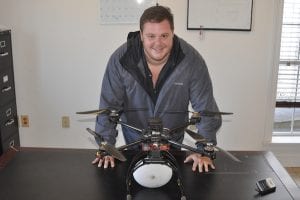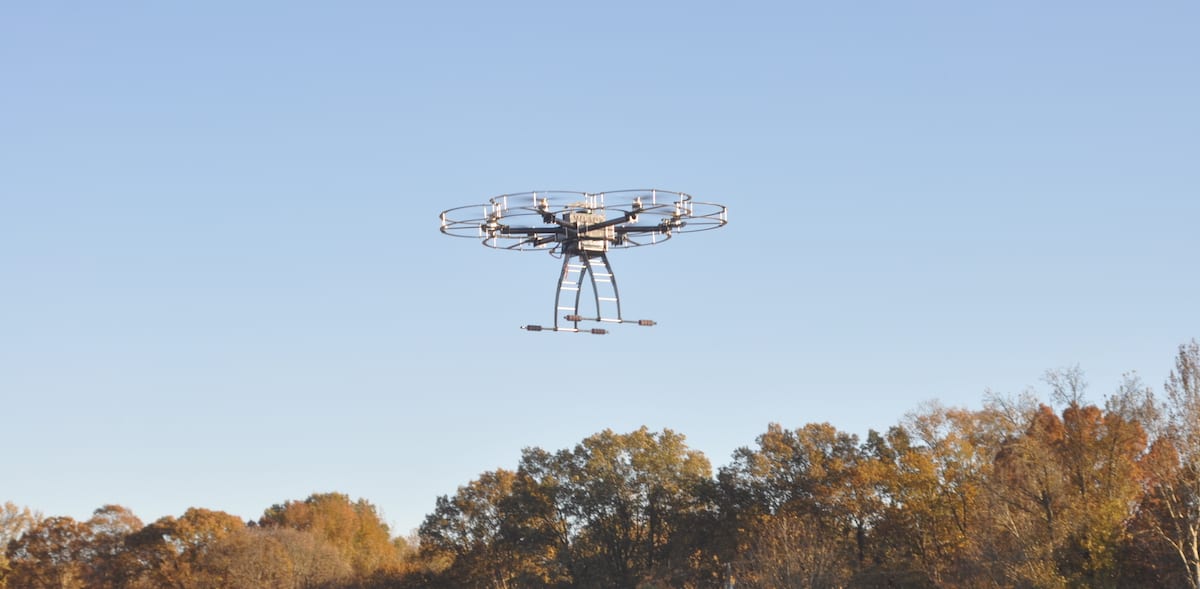 Conor Ferguson had a slight leg-up on the competition as he graduated from Mississippi State University—he’d already started a wireless Internet company with his dad when he was still in high school. That company offered high-speed access to residential areas where other types of broadband didn’t reach. How it works is straightforward—you place one antenna on a tower and another on the the house where you’re providing service.
Conor Ferguson had a slight leg-up on the competition as he graduated from Mississippi State University—he’d already started a wireless Internet company with his dad when he was still in high school. That company offered high-speed access to residential areas where other types of broadband didn’t reach. How it works is straightforward—you place one antenna on a tower and another on the the house where you’re providing service.
The problem was testing to find the optimal location for the receiving antenna.
“You could spend three hours running a test just to figure out you couldn’t get a good signal or get high enough,” Ferguson said.
So while he was in college, he worked on the solution—a drone that could cut that three-hour testing time down to five minutes. That drone, the WISPr Scout, is the centerpiece of his new company, WISPr Systems.
“The way it used to work is you have an antenna attached to a laptop, and you’d be on somebody’s roof or in a bucket truck,” he explained. “You would move around until you could find a signal, and then you’d see if it’s a good, high-quality signal.”
Now, with Ferguson’s new solution, the antenna is on the drone, and the software grabs data from the antenna to guide the drone to the optimal location. Once the installer knows the location, he or she can place the permanent receiving antenna. Problem solved.

Ferguson started the company in August 2017, a few months before he graduated in December 2017 with a degree in electrical engineering. Throughout college he worked “a bunch of different research jobs with drones or autonomous robots,” he said, which is how he learned to build a drone. He worked alongside Austin Ratcliff, who is his co-founder and executive vice president for manufacturing at WISPr Systems. Ferguson is the president and CEO.
“They helped us when we first started up. They did a lot helping with financials and setting up the ‘valley of death’ financial report,” Ferguson said. “And they have gotten us in touch with experts to improve our manufacturing.”
In fall 2017, he pitched the company at Innovate Mississippi’s New Venture Challenge in the student category.
“We placed second and won a little money, plus some lawyer time. It was a good perk for us,” Ferguson said. “At every Innovate Mississippi event we have attended, we’ve met key people who been instrumental in helping us start our company.”
Around January 2018, he says Wade Patterson, president of the Bulldog Angel Network, approached him and suggested they pitch WISPr Systems to the network. Ferguson worked with Eric Hill at the MSU Center for Entrepreneurship and Outreach to come up with the pitch; by the end of the month, they had it figured out.
“It was nerve-wracking before that, but once I knew what I was going to say, it ended up going really well,” Ferguson said.
WISPr Systems raised money from the Bulldog Angel Network and from Innovate Mississippi’s Mississippi Seed Fund in 2018, with the seed fund accounting for $100,000.
That gave them the funds they needed to ramp up production in Batesville and to put together a marketing team. They’ve got preorders that they’ve started to deliver, and a big trade show to prepare for, where they plan to pitch to WISP companies, large and small, from around the country.
Ferguson says that right now they don’t have any competition, but he knows he needs to stay head of the curve. For now the company plans to continue building both the hardware and software for the drone to maintain that advantage.
Manufacturing and other costs in Mississippi are relatively low, another competitive advantage.
“I’m from Batesville, and there are a lot of machine shops here in Batesville, so we wanted to be close to those,” he said.
While cutting the pieces for the drone may eventually move to China once the company is at scale, Ferguson says they’ll continue to assemble them in Mississippi, where they have set up an assembly line and put in manufacturing methods to make it efficient.
Plus, Mississippi is home.
“We had an opportunity to move the company to Florida, but we all like it here,” Ferguson said. “We decided to stay.”


Pingback: Delta Business Journal: Panola Partnership Accelerating Innovative Companies • Innovate Mississippi